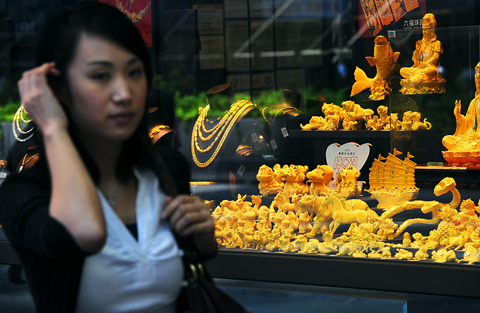Gold hit a record high of US$1,235.50 an ounce by midday in Hong Kong yesterday as investors sought a safe haven over deepening concerns about the eurozone debt crisis.
The precious metal closed at US$1,209.00 in Asia on Tuesday, but later climbed as high as US$1,224.82 an ounce in European trading.
Analysts said the commodity was likely to maintain its safe haven role while other markets remained vulnerable.

PHOTO: AFP
It opened at US$1,229.00, just up from a previous record of US$1,226.56 for the metal set on Dec. 3 last year.
“The response of the central banks and the IMF to the southern European mess is almost guaranteed to ensure continued volatility in world markets,” Capital Spreads analyst Simon Denham said.
Investors had on Monday welcomed the EU and IMF aid package worth 750 billion euros (US$1 trillion) to resolve the debt and budget deficit crisis in Europe.
However, the euphoria faded on Tuesday amid resurgent doubts over countries’ ability to reduce their deficits.
“Gold is holding ground ... and with doubts about the effectiveness of the EU/IMF already surfacing, could be poised for a fresh challenge higher to target last year’s all-time high,” analyst James Moore at TheBullionDesk.com said.
The euro continued to be sold as investors became less eager to take risks. The euro was trading at US$1.2624 at 4:50am GMT.
“Investors are removing funds from risky assets into safer haven plays and this is positive for both the US dollar and gold,” City Index analyst Joshua Raymond said. “The EU rescue package has been widely interpreted as not a long-term solution to the deficit woes within the eurozone. With the near-term outlook remaining unstable, investors have sought to transfer their cash into defensive assets.”
The precious metal, whose two main drivers are jewelry and investment buyers, hit record highs last year on the back of inflationary fears and increasing moves by central banks to diversify assets away from the US dollar.
Heightened concerns about Greece have attracted fresh inflows of cash into gold.
“This resilient performance ... is perhaps telling of the skepticism markets still have over the execution of the plans and the tough fiscal challenges that will face some euro area economies,” Barclays Capital analyst Yingxi Yu said. “While markets remain jittery over the effectiveness of the plans, gold is likely to perform relatively well.”

GAINING STEAM: The scheme initially failed to gather much attention, with only 188 cards issued in its first year, but gained popularity amid the COVID-19 pandemic Applications for the Employment Gold Card have increased in the past few years, with the card having been issued to a total of 13,191 people from 101 countries since its introduction in 2018, the National Development Council (NDC) said yesterday. Those who have received the card have included celebrities, such as former NBA star Dwight Howard and Australian-South Korean cheerleader Dahye Lee, the NDC said. The four-in-one Employment Gold Card combines a work permit, resident visa, Alien Resident Certificate (ARC) and re-entry permit. It was first introduced in February 2018 through the Act Governing Recruitment and Employment of Foreign Professionals (外國專業人才延攬及雇用法),

WARNING: From Jan. 1 last year to the end of last month, 89 Taiwanese have gone missing or been detained in China, the MAC said, urging people to carefully consider travel to China Lax enforcement had made virtually moot regulations banning civil servants from making unauthorized visits to China, the Control Yuan said yesterday. Several agencies allowed personnel to travel to China after they submitted explanations for the trip written using artificial intelligence or provided no reason at all, the Control Yuan said in a statement, following an investigation headed by Control Yuan member Lin Wen-cheng (林文程). The probe identified 318 civil servants who traveled to China without permission in the past 10 years, but the true number could be close to 1,000, the Control Yuan said. The public employees investigated were not engaged in national

The zero emissions ship Porrima P111 was launched yesterday in Kaohsiung, showcasing the nation’s advancement in green technology, city Mayor Chen Chi-mai (陳其邁) said. The nation last year acquired the Swiss-owned vessel, formerly known as Turanor PlanetSolar, in a bid to boost Taiwan’s technology sector, as well as ecotourism in Palau, Chen said at the ship’s launch ceremony at Singda Harbor. Palauan President Surangel Whipps Jr and Minister of Foreign Affairs Lin Chia-lung (林佳龍) also attended the event. The original vessel was the first solar-powered ship to circumnavigate the globe in a voyage from 2010 to 2012. Taiwan-based Porrima Inc (保利馬) installed upgrades with

ENHANCE DETERRENCE: Taiwan has to display ‘fierce resolve’ to defend itself for China to understand that the costs of war outweigh potential gains, Koo said Taiwan’s armed forces must reach a high level of combat readiness by 2027 to effectively deter a potential Chinese invasion, Minister of National Defense Wellington Koo (顧立雄) said in an interview with the Chinese-language Liberty Times (sister newspaper of the Taipei Times) published yesterday. His comments came three days after US Secretary of State Marco Rubio told the US Senate that deterring a Chinese attack on Taiwan requires making a conflict “cost more than what it’s worth.” Rubio made the remarks in response to a question about US policy on Taiwan’s defense from Republican Senator John Cornyn, who said that Chinese